
Mancala is a generic name for a family of two-player turn-based strategy board games played with small stones, beans, or seeds and rows of holes or pits in the earth, a board or other playing surface. The objective is usually to capture all or some set of the opponent's pieces.
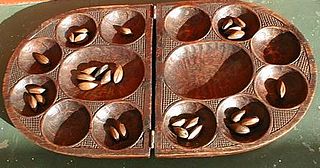
Oware is an abstract strategy game among the Mancala family of board games played worldwide with slight variations as to the layout of the game, number of players and strategy of play. Its origin is uncertain but it is widely believed to be of Ashanti origin.
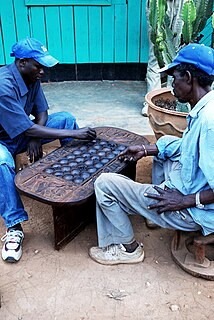
Omweso is the traditional mancala game of the Ugandan people. The game was supposedly introduced by the Bachwezi people of the ancient Bunyoro-kitara empire of Uganda. Nowadays the game is dominated by Ugandan villagers. It is a very hard and fast game said to keep one's mind high and ever excited, which can make it addictive. The equipment needed for the game is essentially the same as that of the Bao game. Omweso is strictly related to a wide family of mancalas found in eastern and southern Africa; these include Coro in the Lango region of Uganda, Aweet in Sudan, [] in Namibia, Kombe in Lamu (Kenya), Mongale in Mombasa (Kenya), Mongola in Congo, Igisoro in Rwanda, and Kiela in Angola.

Bao is a traditional mancala board game played in most of East Africa including Kenya, Tanzania, Comoros, Malawi, as well as some areas of DR Congo and Burundi. It is most popular among the Swahili people of Tanzania and Kenya; the name itself "Bao" is the Swahili word for "board" or "board game". In Tanzania, and especially Zanzibar, a "bao master" is held in high respect. In Malawi, a close variant of the game is known as Bawo, which is the Yao equivalent of the Swahili name.

Pallanghuzi, or Pallankuli, is a traditional ancient mancala game played in South India especially Tamil Nadu and Kerala. Later the games were spread to other places including Karnataka and Andhra Pradesh in India as well as, Sri Lanka and Malaysia. Variants are called as Ali guli mane, Vamana guntalu, and Kuzhipara. The game is played by two players, with a wooden board that has fourteen pits in all (hence the name from the words fourteen pits. There have been several variations in the layout of the pits, one among them being seven pits on each player's side. The pits contain cowry shells, seeds or small pebbles used as counters. There are several variations of the game depending on the number of shells each player starts with.
Jarmo is a two-player abstract strategy board game. According to Tartarian and Polish legend, Batu Khan, the grandson of Genghis Khan, carried this game around during his military campaigns. Supposedly, he would play at least one game before a battle in order to prepare himself. In this game, a player attempts to place as many of their pieces onto the other player's first row. At the same time, the player tries to capture as many of the other player's pieces on the way.
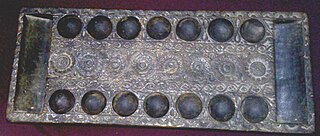
Ali Guli Mane is an abstract strategy board game of the mancala family, from Karnataka in South India. It is known as Chenne Mane in Tulunaadu, Akal Patta in North Karnataka and Satkoli (सत्कोलि) in Maharashtra. The name of the game, like that of many mancala games across the world, is simply a description of the board used: it means a "wooden block with holes". It is similar to Pallanguzhi from the neighbouring state of Tamil Nadu. There are also similarities with the traditional Malay mancala game Congkak.
Andada is a traditional mancala game played by the Kunama people of western Eritrea. It closely resembles other mancalas from East Africa such as Enkeshui and Layli Goobalay.
Anywoli is a traditional mancala game played by the Anuak people of the Gambela province, in Ethiopia, as well as in the Akobo, Pochalla and Jokau regions of Sudan. The name of the game means "bringing to life". Anywoli has similarities to mancalas found in Nigeria and Ghana, such as Ba-awa and Obridjie.
Aw-li On-nam Ot-tjin is a traditional mancala game played by the Penihing people of Borneo. The first transcription of the rules of the game is due to norwegian ethnographist Carl Sofus Lumholtz. Despite its origin, Otjin is similar to african mancalas such as Ba-awa (Ghana) and quite different from most Asian mancalas.
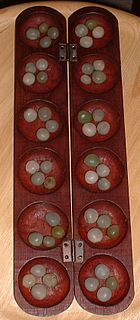
Ayoayo is a traditional mancala played by the Yoruba people in Nigeria. It is very close to the Oware game that spread to the Americas with the atlantic slave trade. Among modern mancalas, which are most often derived from Warri, the Kalah is a notable one that has essentially the same rules as Ayoayo.
Hawalis is a traditional mancala game played in Oman as well as Zanzibar, where it is known as Bao la Kiarabu, with slightly different rules. It is closely related to African mancalas such as Bao, Njomba, Lela, Mulabalaba (Zambia), Muvalavala (Angola) and Tschuba.
En Gehé is a traditional mancala game played by the Loitha and Kisonga Maasai groups of northern Tanzania. The game was first described in 1904 by a German soldier, Moritz Merker, who was serving in the Kaiserlichen Schutztruppe in German East Africa. Merker later became the first ethnologist to study the Maasai culture.
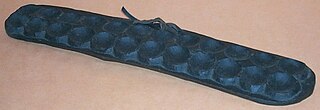
Enkeshui is a traditional mancala game played by the Maasai of both Kenya and Tanzania. It is a rather complex mancala game, and bears some similarities to the Layli Goobalay mancala played in Somaliland.
Kiothi is a traditional mancala game played by the Meru people in Kenya. The word "kiothi" simply means "to place". This mancala is closely related to the Enkeshui and the Giuthi mancalas, respectively played by the Maasai and the Kikuyu.
Krur is a traditional mancala game played by the Hassaniya people in western Sahara, along the border of Nigeria and Mauritania, in southern Morocco, in Algeria, in northern Senegal, in Mali and in Niger. It is a children's game, very close to other simple African mancala such as Layli Goobalay (Somalia) and Nsa Isong (Nigeria).
Lamlameta is a traditional mancala game played by the Konso people living in the Olanta area of central Ethiopia. It was first described in 1971 by British academic Richard Pankhurst. It is usually played by men. The name "Lamlaleta" means "in couples".

Layli Goobalay is a board game played in parts of Somalia. It is a variant of the classical count and capture game mancala, which is one of the oldest two-player strategy board games played throughout the world. Layli Goobalay means "to exercise with circles" in the Somali language.
Tsoro is an ancient two-player mathematical strategy board game that has been played for over a thousand years. It has its roots in Zimbabwe and was first described in literature by J. B. Matthews in 1964. Tsoro belongs to the same class of African strategy board games collectively called Mancala, such as Oware, Bao, and Kalah.








